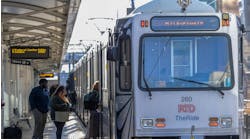CityBus Launches CNG Fueling Station
CityBus officially opens the state’s first public transit organization compressed natural gas (CNG) fueling station at a ribbon-cutting event on April 9 at 3:30 p.m. The event, held in conjunction with the nationwide Stand Up for Transportation Day, will take place at the CityBus administrative offices.
The addition of the CNG station makes CityBus the first public transit agency to do so in Indiana. While $3.3 million was budgeted for the station, the project was completed early and under budget with a final cost of just under $3.1 million.
“We’re keeping our expenses in line, running vehicles with lower emissions and sourcing domestic energy,” said Martin Sennett, general manager.
In addition, six new CNG regular route buses are on the road along with four CNG paratransit vehicles. Using CNG buses will help cut fuel, maintenance and bus purchase expenses versus traditional diesel and diesel electric hybrid buses. A new diesel electric hybrid bus costs just over $600,000 while a new CNG bus is $470,000.
“We’re not having a lot of growth in our normal revenue streams,” Sennett said. “In order to keep the high levels of service our riders need and expect, we have to find savings. Fuel is one of our biggest costs so using CNG will provide savings while offering a more environmentally friendly alternative to diesel.”
The CityBus fleet will eventually run completely on CNG. As buses are retired they will be replaced with CNG fueled vehicles. Sennett projects a savings of $10 million over 10 years.
“We’re proud to be at the forefront in our state and look forward to cost savings as we continue to add CNG vehicles to our fleet,” Sennett said.
The CNG station ribbon-cutting is the same day as “Stand Up for Transportation Day”— a nationwide effort to draw attention to the urgent need for federal funding of public transit. It is sponsored by the American Public Transportation Association. CityBus joins more than 240 organizations and community groups throughout the U.S. to call for action as expiration of Federal Transportation Bill approaches on May 31.


